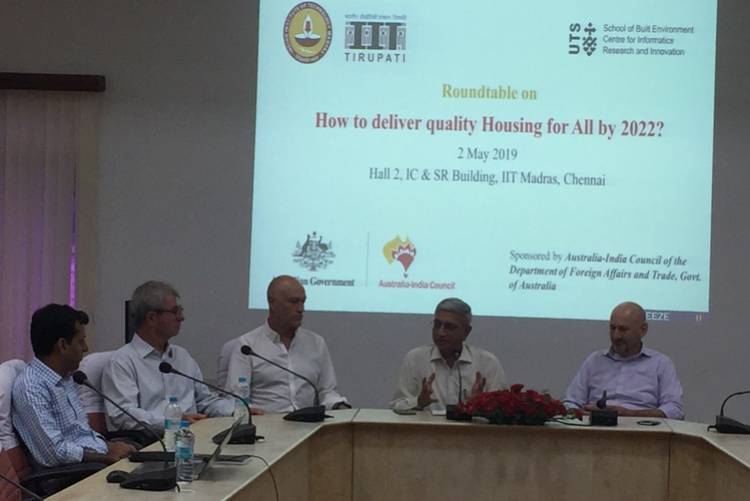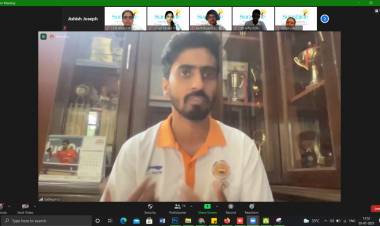IIT Madras collaborates with University of Technology Sydney to explore Manufacturing solutions to house India’s Urban Poor

Photo Caption: (L_R) Dr. Ashwin Mahalingam, IIT Madras, Prof Marton Marosszeky, Sydney, Prof. Perry Forsythe, UTS, Australia, Prof KN Satyanarayana, Director, IIT Tirupati and Prof Sidney Newton
IIT Madras collaborates with University of Technology Sydney to explore Manufacturing solutions to house India’s Urban Poor
Institute hosts Roundtable with key construction industry stakeholders from industry, academia & the Govts of India & Australia taking part
CHENNAI, 2nd May 2019: Indian Institute of Technology Madras hosted a Roundtable to explore how mass-produced, pre-fabricated building solutions, lean construction principles, and emerging digital technologies can be applied to significantly increase the number and quality of houses provided to the urban poor.
The Roundtable was conducted on campus today (2nd May 2019) as part of the project titled ‘Enabling prefabricated construction to improve mass housing delivery in India and Australia’ funded by Australia-India Council of the Department of Foreign Affairs and Trade, Govt. of Australia. The project is jointly conducted with the University of Technology Sydney (UTS), Australia, and IIT Tirupati.
The aim of the roundtable is to bring together key construction industry stakeholders from industry, academia and government in India and from Australia and explore Manufacturing solutions to house India's urban poor. IIT Madras is playing a lead role in driving change for the better in the construction industry in India and is a global leader in effective construction management research. The strategic research partnership between IIT Madras and the University of Technology Sydney has resulted in broad range of research collaboration, a series of joint PhD supervision, and the production of professional practice development programs.
Addressing the event, Prof Sidney Newton, Director, University of Technology Sydney, School of Built Environment Centre for Informatics Research and Innovation, said, “The roundtable represents a unique opportunity to bring international expertise in mass-customisation, lean construction and digital technologies, together with key industry stakeholders to address the pressing social need for better quality, cheaper and more durable housing for the urban poor. It is a crucially important agenda.”
Further, Prof Sidney Newton, also the UTS Project Lead, added, “The unprecedented demand for low-cost housing in India is driving fundamental change in how the construction industry is structured and managed. This roundtable will prove pivotal in directing and enabling new innovations in the mass-customisation and lean construction management needed to deliver affordable housing for all.”
The outcomes from this event will comprise a short briefing paper on what needs to be done most immediately in India to drive fundamental change for the better in the construction industry, and by whom. Beyond the roundtable outcomes, the project aims to deliver a knowledge exchange hub between India and Australia that will curate best practice in housing construction across international boundaries.
Addressing the Roundtable, Prof. Koshy Varghese, Department of Civil Engineering, IIT Madras, said, “India has a huge housing demand. Methodologies discussed as a part of this roundtable will be useful in enabling us to understand how these demands can be addressed. Not all of these are totally new in the Indian context but one of the key challenges the roundtable aims to address is how to scale these technologies in India.”
The roundtable will also help shape new joint graduate education programs between IIT Madras and UTS, specifically to address key practice issues identified during the discussions. Associated study tours in India and Australia will also seek to improve cultural understanding between India and Australia that will inform a second roundtable in June 2019 in Sydney.
IIT Madras has been actively working in Housing innovations for several years. From developing the Glass Fibre Reinforced Gypsum (GFRG) technology for Indian conditions to being a pioneer in evangelizing the use of Building Information Modeling and Lean Construction, the institute has worked with private developers and government agencies to build houses faster, cheaper and to higher levels of quality.
More recently, CUBE (Center for Urbanization Buildings and the Environment), set up by IIT Madras, is working with the Governments of Tamil Nadu and Andhra Pradesh to accelerate the use of rapid construction technologies for mass housing, in practice.
UTS is the overall lead on this project. Experts from Australia participated in the Chennai roundtable. UTS will host a second roundtable and local study tour in Australia in June 2019 with participation from industry, academia and government in India. UTS is partnering with IIT Madras on a range of projects to develop new approaches to the project management of complex/mega infrastructure projects, digital twin technologies and new methods of construction.




















